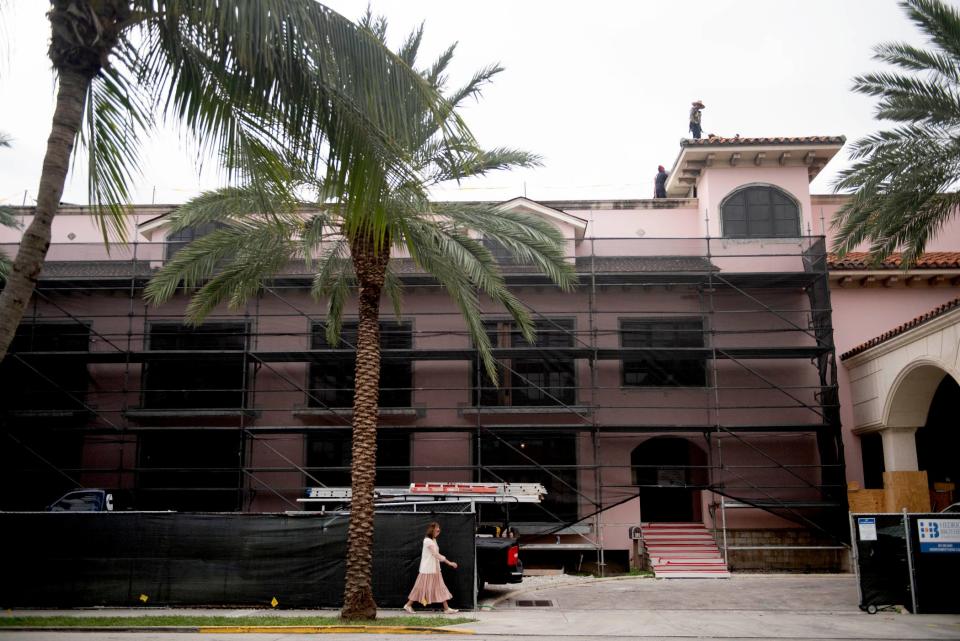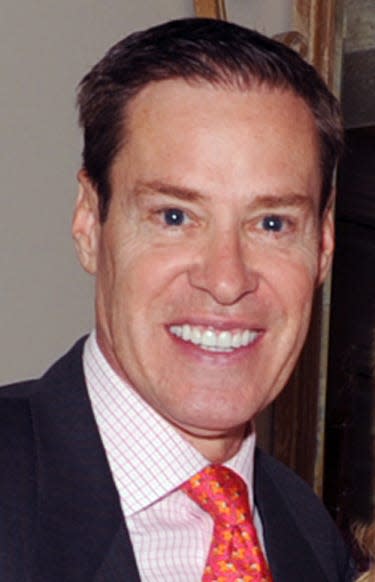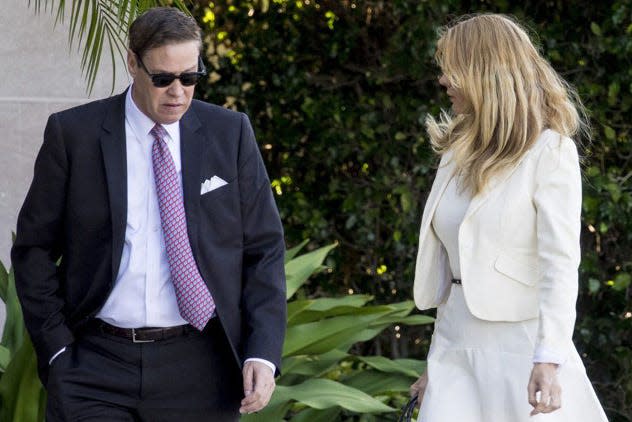Former Palm Beach developer Robert V. Matthews gets 65-month prison sentence in hotel case
- Oops!Something went wrong.Please try again later.
Former Palm Beach hotel developer Robert “Bob” V. Matthews is headed to prison for more than five years after being described by federal prosecutors in Connecticut as a “grifter” who perpetrated “widespread and brazen” fraud, according to a presentencing memorandum.
U.S. Judge Victor Bolden of Connecticut on Monday sentenced Matthews to serve a prison term of 65 months — or, five years and five months — during a hearing that came more than four years after Matthews pleaded guilty to one felony count each of conspiracy, illegal monetary transactions and tax evasion. Matthews must report to prison Oct. 23, and his term there will be followed by three years of supervised release, the judge ruled. He must serve at least 85% of his sentence under federal sentencing rules.
The charges in his guilty plea involved financial improprieties linked to a failed renovation project in Palm Beach at the Palm House hotel, which Matthews once owned near the ocean at 160 Royal Palm Way. The case involved money transfers between bank accounts in Florida and Connecticut, where Matthews, 65, had residences.
Prosecutors said Matthews spearheaded a fraud and money-laundering scheme that bilked more than $30 million out of about 61 foreign investors who put in $500,000 each and were told their money would go to the renovation of the luxury Palm House hotel property.
Matthews’ sentence was delivered in Bolden’s Bridgeport courtroom for the U.S. District of Connecticut. Any restitution to be paid by Matthews “will be determined after additional court proceedings,” according to a statement released Monday by the office of U.S. Attorney Vanessa Roberts Avery for the District of Connecticut.
Court documents said Palm House promotional materials misrepresented the project to the investors, falsely implying that prominent people such as former President Bill Clinton, former first lady and Secretary of State Hillary Clinton and even now former President Donald Trump were serving on an “advisory board” for the Palm House and its membership-only private club.
The money from the investors, who were mostly from China, came through the old EB-5 program, according to court filings. The federal program expedited permanent immigration visas — so-called green cards — for foreign nationals who put at least $500,000 into projects that created American jobs under specific conditions.
Matthews “lavishly” spent money from those investors on himself, including the purchase of two homes in Connecticut, one of which he previously had lost in foreclosure; a yacht; and a Maserati, all mentioned in the presentencing memorandum prepared by the U.S. Attorney's office in Connecticut. Among other expenditures, Matthews also paid off personal credit-card debt and local taxes with the funds, the document said.

Victims of Palm House detailed effects in letters to the court
Matthews' criminal schemes stretched between 2007 and 2018, prosecutors said, with the EB-5-related fraud generally taking place between 2012 and 2014, prosecutors said.
“This is not a case where the defendant made a single mistake or exercised bad judgment on an isolated incident. Instead, the defendant executed multiple multifaceted scams that involved dozens of victims — banks and individuals alike — across 10 years in amounts totaling tens of millions of dollars. The EB-5 money belonged to real people who had worked hard to earn it,” the prosecutors’ sentencing memorandum said.

None of the fraud victims was scheduled to speak Monday at the sentencing hearing, a spokesman for the U.S. Attorney’s office confirmed.
But prosecutors submitted a number of letters from fraud victims to the court stating how the Palm House scam had affected them and their families. One Chinese victim, whose identity was not disclosed, wrote that losing the investment had derailed the family’s plans to send a daughter abroad to school.
“I must endure the mental torture in (an) attempt to recover the invested loss; and, on the other hand, I live frugally to save money and borrow loans to pay for the cost of my daughter’s study abroad,” the victim wrote. “It can be said that my life has been on the verge of collapse multiple times in recent years.”
Matthews bought the Palm House property in 2006, announced renovation plans and lost the property in foreclosure in 2009. In August 2013, he reacquired control of property, although his ownership role was cloaked in public records. Construction came to an abrupt halt in late 2014 and did not resume until after the property was sold in May 2019 for nearly $40 million in a sale sanctioned by a bankruptcy judge.
Before it sold, the Palm House renovation project was mired for years in legal troubles, including lawsuits, foreclosure proceedings, investigations by the Securities Exchange Commission, town code violations and bankruptcy.
Matthews was arrested at his Palm Beach beachfront mansion in March 2018 and entered his guilty plea in April 2019. He had been free on bond since shortly after his arrest and today lives in Palm Beach Gardens, according to a statement released after Monday's sentencing by the district attorney's office.
GUILTY PLEA: Former developer Robert V. Matthews pleads guilty in Palm Beach hotel-fraud case
Robert Matthews has been “shamed by his own misdeeds,” his lawyer says
In a presentencing memorandum prepared for the court, David A. Ring, Matthews’ Connecticut attorney, described his client as “humbled by life’s circumstances and shamed by his own misdeeds” in a rags-to-riches-to-rags scenario. Matthews is destitute and has suffered ill health in the years since his arrest, Ring wrote.
Matthews also saw the infusion of EB-5 investors’ money as a way for him to bounce back after losing the Palm House in foreclosure in 2009 during the Great Recession, Ring wrote.
“Bob did not set out to run the Palm House project into the ground and permanently deprive the investors of their funds. Rather, Bob foolishly and selfishly sought to have his cake and eat it too — hoping to use investor funds for his own benefit while still developing a world-class hotel,” Ring wrote.
“What he did was wrong and harmful. But it was not a classic take-the-money-and-run fraud. Even had Bob not been prosecuted criminally for his actions, his approach to the project was bound to, and did, result in his own financial ruin. It was an ill-conceived scheme from the start, made from equal parts of hope, optimism, and greed.”
Ring also wrote that the EB-5 victims “have received over $18 million of their original $30.5 million investment from the Palm House bankruptcy proceedings and Securities Exchange Commission” as well as confidential bank settlements.
Since his arrest, Matthews has developed a vastly different perspective about the definition of success, Ring wrote and “has become more personal and profound. As can be seen from the many letters submitted to the Court, Bob is engaged in a wide range of community services, and is a powerfully positive influence in many people’s lives.”
Proscecutors asked for sentence minimum sentence of about 13 years
Prosecutors acknowledged in their presentencing document that Matthews had no prior criminal record and had achieved “success while on pretrial release” by not violating the release terms.
Matthews initially had pleaded not guilty after his arrest on 21 felony counts
The three counts to which he eventually pleaded guilty carried a maximum term of 45 years, but federal sentencing guidelines instead call for a sentence of between about 13 years and about 15-and-a-half years.
Ring’s memorandum to the court recommended a “more appropriate and typical” sentence” of 27 months — or, two years and three months — based on Connecticut sentencing statistics for “defendants over (age) 60 convicted of fraud.”
Two other defendants await sentencing in Palm House-linked cases
The tax-evasion charge resulted after prosecutors said Matthews evaded at least $2.75 million in federal income tax, penalties and interest based on his failure to pay taxes in 2005 and 2007, prosecutors said.
“Using shell companies and bank accounts in the names of other people, the defendant put real property, personal property, and cash assets beyond the reach of the Internal Revenue Service,” the prosecution’s presentencing memo said.
Matthews’ ex-wife, Maria “Mia” Sneden Matthews, also was charged with one count of tax evasion in the case. She pleaded guilty to that charge in April 2019, but her sentencing date has not yet been set. The couple divorced in June after 26 years of marriage.

Two other men also entered guilty pleas in the case in 2018.
Nicholas Laudano, a former construction executive at the Palm House, pleaded guilty to two felony counts — conspiracy to commit bank fraud and taking part in an illegal monetary transaction. In June, he was sentenced to supervised release and time served.
Connecticut commercial real estate broker Gerry Matthews — Robert Matthews' brother — is scheduled to be sentenced in September after pleading guilty to one felony count of conspiring to commit wire fraud.
Another man, Palm Beach attorney Leslie R. Evans, pleaded not guilty after being charged in the case in 2018 on multiple counts. This past April, Bolden dismissed all of the charges against Evans and cleared his criminal record in the Palm House case. Bolden’s ruling came after Evans successfully completed a so-called “pre-trial diversion” program, which allows defendants who abide by certain provisions during a specified time period to have their cases dismissed.
Foreclosures were key to two of Matthews' fraud schemes, prosecutors said
In their sentencing memorandum and Robert Matthews’ plea agreement, prosecutors outlined how he perpetrated his fraud schemes, often with help from others.
Beginning in 2007, prosecutors said Robert Matthews perpetrated a bank fraud centered on the Point Breeze Hotel, which he was developing in Nantucket, Massachusetts. He obtained a loan from the institution that is today TD Bank, spent the money on himself, defaulted on the loan and then schemed to prevent the bank from recovering $12 million it was owed in foreclosure, according to the government.
In 2014, court documents said, Robert Matthews used Palm House money in a bank fraud against JPMorgan Chase bank. He bought — out of foreclosure — a Connecticut home at 115 Lower Church Hill Road in Washington Depot using various shell entities to cloak his involvement, the government charged. Once that house was free and clear, the defendant got cash from a loan against the house, “essentially laundering money through the property,” his plea agreement states.
In his plea agreement, Robert Matthews admitted to spearheading an illegal wire transfer in April 2014 of $2.6 million between bank accounts in Florida and Connecticut.
Robert Matthews also conspired with others to defraud JPMorgan Chase Bank by misappropriating insurance proceeds earmarked for the repair of one of his Washington Depot properties, prosecutors said.
Progress in Palm House cases was delayed in part by pandemic
Robert Matthews' case — and those of the other defendants — had been simmering for years. People familiar with the court say the delays can be blamed, at least in part, on the coronavirus pandemic because many of the Palm House investors were burdened by travel restrictions to come to the United States because they live in China and Iran.
The buyer of the unfinished Palm House project in 2019 paid a recorded $39.6 million for the property. The new owner — an affiliate of the international hospitality and real estate firm London & Regional Properties — is renovating the 79-room building and grounds.
*
This is a developing story. Check back for any updates.
*
Darrell Hofheinz is a USA TODAY Network of Florida journalist who writes about Palm Beach real estate in his weekly “Beyond the Hedges” column. He welcomes tips about real estate news on the island. Email dhofheinz@pbdailynews.com, call 561-820-3831 or tweet @PBDN_Hofheinz. Help support our journalism. Subscribe today.
This article originally appeared on Palm Beach Daily News: Ex Palm Beach developer gets 65 months in prison in hotel fraud case

